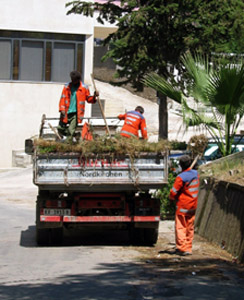Local Governments Empowered
Albanian municipalities are cleaning up their cities
Pogradec, Kavaje and Kuçove municipalities are part of the USAID/Albania Local Government Assistance and Decentralization program. For three years USAID, with the Urban Institute (UI) as its implementing partner, has been working with fifteen pilot cities and providing technical assistance to another fifty. This activity provides support for various legislative initiatives and local government activities that collectively advance the decentralization process and increase the control of local governments by local constituents, while incrementally decreasing the control by central authorities. USAID is training municipal staff on how to collect citizen input and opinion; prepare budgets, action plans and financial analysis; schedule budget hearings; draft fiscal policy; and identify options for increasing revenues. These lessons among many others are now being taken to the field and put into practice.
Local budgets reflecting citizens’ priorities
In a small town close to the picturesque Lake Ohrid, which attracts tourists from all over the region, the staff from the Municipality of Pogradec were able to fully apply their skills learned from the decentralization program. “Before we conducted the survey, we thought that it was most important to improve the roads,” said Dhimitraq Gjata, Director of Infrastructure. “But from our survey results we found out that the citizens wanted street lighting improved first and green space second. We even discovered that the citizens were willing to pay an extra fee.”
 |
| Kavaja street cleaners |
In rapid response, the Pogradec Municipality staff applied a technique pioneered by UI called the “trained observer ratings” for the assessment of the park, which had been damaged by illegal building construction. They produced a budget analysis and project design, achieved approval from the City Council, and allocated funding towards the installation of 180 lights and expansion and improvement of their parks. With a complete set of documents they were even able to convince local businesses to contribute in-kind with man-power, seeds and fertilizer for the park. Fillareta Buzo, Director of Public Services says, “When people have a clear vision of what to do, everyone is willing to help.”
In Kavaje and Kuçove, two small cities near the capital, Tirana, streets were covered with plastic bags and rotting food. Garage bins were overflowing at all times of the day and mountains of trash lay on the sides of the city’s peripheral roads in communities recently built up in the last 10 years. Now, due to their new service improvement program the streets are clean. After receiving technical assistance, both municipalities are able to allocate funds and raise local fees to pay for increased frequency of collection and new garbage bins.
“We think of ourselves as working within a team. The community, the City Council and all of the staff work together and know where the money is being spent. The key to our success is through transparency,” says the Mayor of Kuçove. With USAID’s assistance, Kuçove developed a City Commission that responds to citizen’s requests and distributes a monthly report that announces the municipal agenda, city council decisions and citizen feedback.
Hysni Shamata is Chief of Services at the Kavaje Municipality. He explained that for years his job was mostly symbolic. The government would decide on expenditures, and it was never enough. “Now, I feel I can make a change. We listen to the citizens and prepare our budget accordingly. When other cities see that we are succeeding, they come to us for advice.”
Kavaje has increased garbage pick-up service by 10%, and 50% more families in the suburbs can rely on quality garbage collection. They hope that by 2006, operating costs for the improved service will be fully funded by locally generated taxes. Kučove has expanded their service to road sweeping and cleaning and have replaced their horse and trailer pick-up service used in 1997 to a convoy of new trucks.
Formula accepted
In 2001, for the first time in the history of Albania, local governments were given by law the authority to decide how and where resources generated by local taxes could be spent. But it was not until 2002, with the assistance of USAID, that municipalities could act upon this law. The central government accepted a formula developed through the decentralization program, Ministry of Finance, Ministry of Local Government and Decentralization and the World Bank that determines the amount of state resources to be allocated unconditionally to the local governments.
Albania is the first country in the Balkans to implement such a formula. It depoliticizes and decentralizes the past procedures for the transfer of state resources that were followed during the communist regime and since its collapse in 1991. In 1998, local governments barely controlled eight percent of the local expenditures in Albania. Today, they are in control of almost 50%.
“Going from a system where the government controlled, owned and did everything to a structure where authority is given up to local officials is a major step to the democratization of Albania,” says Bart Kennedy, Chief of Party for the UI in Albania. No longer will the budget for services such as the asphalting of roads, improvement of garbage collection or adding staff to a city hall be decided by the Ministries based often 100 kilometers away from the beneficiaries. The people now have a say.
Schools take control of maintenance
Until recently, the Ministry of Education had complete control of operation and maintenance of education facilities. Because of this centralized system, funds were ‘lost’ and/or distributed only to the more visible urban schools. Most schools were neglected for many years and remain in deplorable conditions with non-functioning toilets, collapsing roofs and broken windows (to name just a few problems).
Since the creation of the formula for allocation of funds, decisions for the use of state resources are decentralized. Now, local education directorates, municipal engineers, school directors and parents are able to direct government funds generated from local taxes towards the maintenance of their schools. To assist in the decentralization process, UI conducted a series of trainings that teach stakeholders how to assess the condition of their own schools, prioritize needs and create a budget reflecting those needs.
Spresa Blaceri, a school director in Pogradec, has been part of the program for three years. Together with the Municipality and working group, they were able to systematically assess the condition of school buildings in the city and decide on a strategic maintenance plan. They then allocated funds first to the oldest school with the most safety hazards and then to the other schools. “I have been wanting to make repairs to our school for years, but had no say in the way school funding could be spent,” says Spresa. “Now, I can make requests directly to the municipality. We finally have classrooms without leaky, collapsing roofs.”
Times are changing
Due to USAID’s assistance, citizens and local authorities throughout Albania feel empowered; having a platform from which to stand and to advocate for improvement of services within their cities. They come well prepared when standing in front of their City Council to defend the reasoning behind their budget and action plan. Because of the Local Government Assistance and Decentralization program, activities are being realized and living conditions are improving for the people of Albania.
Back to Top ^
|


